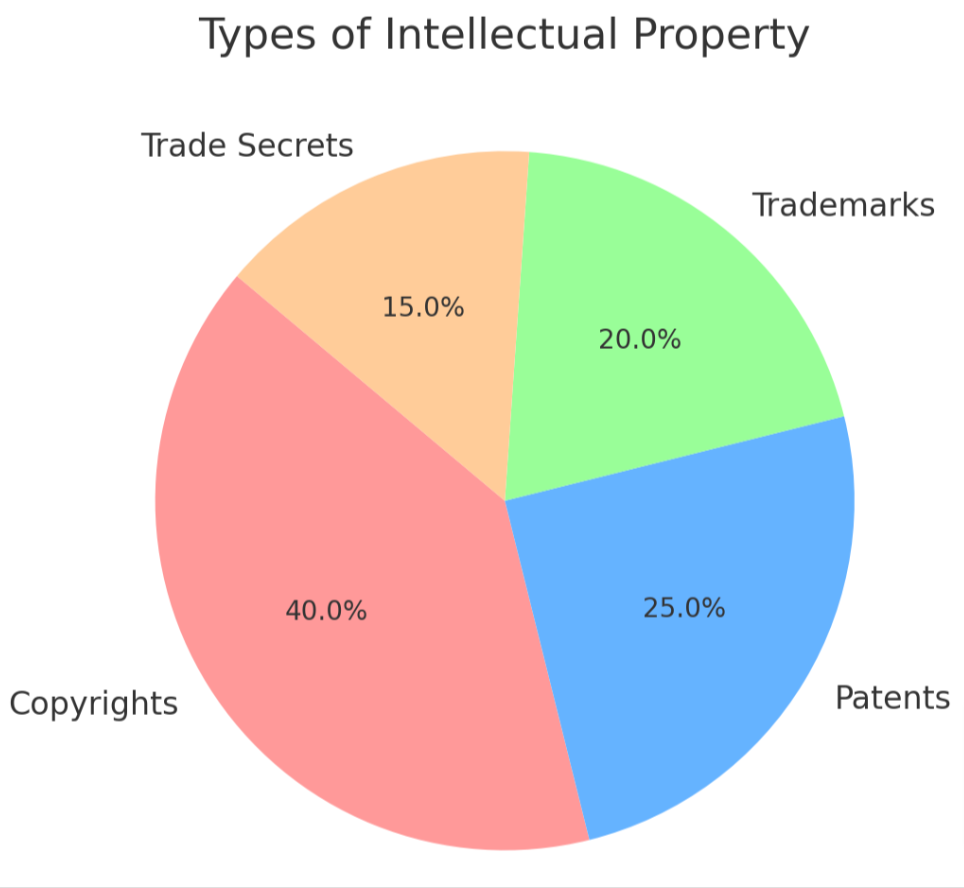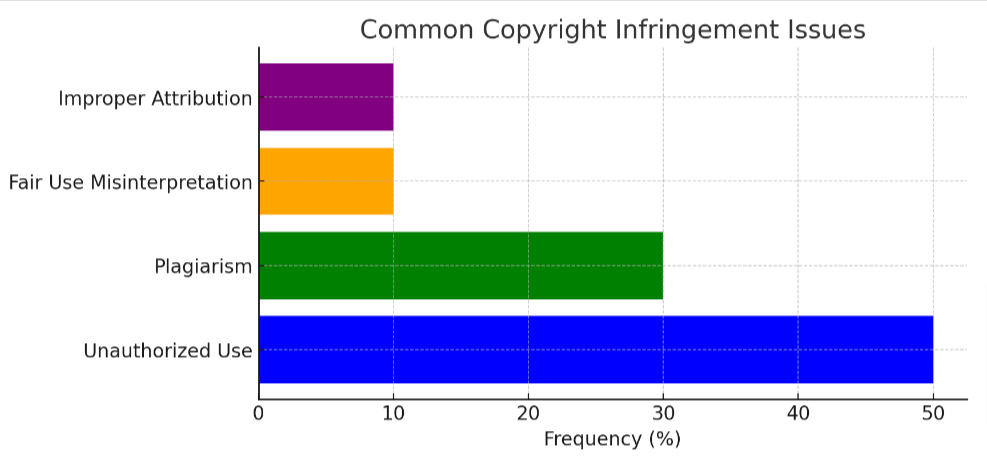Protecting Your Creative Rights as a Reviewer
Reviewing scholarly work is tricky when you’re unsure about legal boundaries. Did you know every creative piece automatically gets copyright protection upon creation? This article will clear the fog around your rights and responsibilities as a reviewer, so you stay within the law.
Read on to keep it legal!
Key Takeaways
- Copyright automatically protects original creative works, like scholarly articles, as soon as they are in tangible form. Reviewers must respect these rights and not use or distribute the content without permission.
- Open access articles have different rules; authors grant licenses that spell out how others can use their work. Subscription articles are behind paywalls, but copyright still applies just as strongly to these works.
- Reviewers play a vital role in maintaining ethical standards by understanding author rights which include reproduction and distribution control over one’s own work and providing acknowledgment for third-party material used.
- Understanding agreements and exceptions is crucial for reviewers. They should be aware of fair use guidelines when using excerpts from reviewed materials to avoid copyright infringement.
- Protecting your own reviewer work involves registering copyrights for additional legal backup, respecting international copyright laws if reviewing foreign works, and keeping detailed records including correspondence with authors or publishers.
Understanding Copyright Laws for Reviewers
Copyright laws can be complex, but it’s important for reviewers to understand how they apply to their work. This section will cover the basics of copyright, how it applies to reviewers, and Taylor & Francis commitments for all articles.
What is Copyright?
Copyright gives creators of original works the exclusive right to use and share their creations. This covers a wide range of materials including books, music, movies, paintings, and scholarly articles—any form that can be shared or seen by others.
Under federal law, this protection kicks in automatically as soon as an original work is put into tangible form; let’s say you write a poem on paper or save it on your computer, it’s immediately under copyright.
This legal concept aims to encourage creativity by giving authors control over their own works. It means others can’t reproduce your work without permission, whether they’re passing off your novel as their own or using part of your painting in their advertising.
However, exceptions like fair use do exist which allow for limited uses like criticism or education without violating copyright rules.
How does Copyright Apply to Reviewers?
Transitioning from understanding copyright basics, it’s essential to consider how these laws impact reviewers. Reviewers have a unique role in assessing and critiquing works before publication.
Their input is valuable but also bound by the same federal law that protects original creative works. When handling manuscripts, reviewers must respect exclusive rights of authors which include not reproducing or distributing the content without permission.
Handling unpublished scholarly articles brings responsibility for maintaining confidentiality and intellectual property rights. Intellectual property protection extends to the drafts and data shared during the review process.
Reviewers contribute their own insights and critiques, yet they should avoid incorporating any part of what they review into their work without proper authorization or licensing agreements.
Any excerpt used should fall under fair use guidelines ensuring they don’t infringe on authors’ intellectual property rights.
Copyright in Open Access and Subscription Articles
Open access articles shake up the usual copyright rules. They are freely available to anyone with internet access, letting people read, download, and often distribute the material without much restriction.
However, authors of open access papers still hold copyright; they usually grant a license that details how others can use their work. This might mean applying a Creative Commons license that specifies whether users need to give credit, if they’re allowed to make changes or use it commercially.
With subscription-based articles, things get more traditional. The publisher typically controls who gets to see the article—they put it behind a paywall where only subscribers or those who pay a one-time fee can access the full content.
Even though readers have limited access, copyright laws still protect the original works of authorship inside these pages just as strongly as in open-access journals. Authors may retain some rights but will generally transfer exclusive rights over to publishers — from reproduction to distribution — under specific terms outlined in their agreement.
Taylor & Francis Commitments for all Articles
Taylor & Francis ensures that all articles published in their journals adhere to high ethical standards and copyright protection. Authors are required to grant Taylor & Francis the right to publish and distribute their work, while retaining specific rights for themselves.
This commitment helps protect reviewers by ensuring that they can have confidence in the originality and integrity of the articles they review. Moreover, Taylor & Francis provides clear guidelines on copyright policies, enabling authors and reviewers to understand their rights and responsibilities within the publishing process, which further safeguards intellectual property rights throughout the review process.
Understanding Author Rights
Authors have the right to control how their original creative works are used, and as a reviewer, it’s important to understand these rights in order to protect your own work. To learn more about how author rights apply to reviewers, keep reading!
What are Author Rights?
Authors have specific rights to their original creative works, which are protected under federal law. These rights give them the exclusive ability to reproduce and distribute their work, create derivative works, and control the public display of their tangible expressions.
Copyright law safeguards an author’s right to claim ownership of their scholarly articles or other original works of authorship. It also protects against plagiarism and unauthorized use by providing legal recourse if someone infringes upon those rights.
Author rights encompass the legal protection provided by copyright laws and intellectual property regulations. Understanding these rights is crucial for reviewers as they navigate the copyright review process and consider how best to respect authors’ exclusive rights while conducting thorough assessments of scholarly papers.
Why are Author Rights Important for Reviewers?
Author rights are crucial for reviewers as they protect their intellectual property and ensure that their contributions are respected. By understanding author rights, reviewers can safeguard their original creative works from infringement, maintain control over the reproduction and distribution of their scholarly articles, and preserve their exclusive rights to determine the publication date.
Protecting author rights also helps reviewers to prevent plagiarism and unauthorized use of their work, promoting fair and ethical practices within the academic community. Additionally, being aware of copyright laws enables reviewers to acknowledge third-party material appropriately while adhering to licensing agreements, exceptions, and limitations.
Understanding author rights is essential for maintaining integrity in the review process. It allows reviewers to uphold intellectual property protection while contributing meaningfully to academic literature without fear of exploitation or misrepresentation.
Copyright and Intellectual Property
Understanding the nuances of copyright and intellectual property is crucial for reviewers. It’s important to comprehend that intellectual property rights protect original creative works, granting authors exclusive rights to reproduce their tangible expressions.
This applies to scholarly articles and review materials, emphasizing the significance of respecting authorship rights and adhering to copyright law. Furthermore, being aware of licensing agreements, fair use, plagiarism issues, and digital rights management plays a pivotal role in the review process while safeguarding against copyright infringement.
Reviewers must ensure that they respect intellectual property laws when conducting their reviews. This involves acknowledging third-party materials used in scholarly articles, understanding patents and trademarks related to original works of authorship, as well as recognizing content within the public domain or under Creative Commons licenses.

Author Conduct and Copyright
Transitioning from the discussion of copyright and intellectual property, it’s important for reviewers to understand author conduct and copyright. Reviewers must adhere to federal law and respect authors’ exclusive rights over their original creative works.
When reviewing scholarly articles, it is essential to acknowledge the author’s tangible form of expression and publication date.
As reviewers navigate the copyright review process, they should be aware of licensing agreements that protect authors’ intellectual property rights. Reviewers play a critical role in upholding ethical standards by refraining from any actions that may infringe upon an author’s copyright through plagiarism or unauthorized use of copyrighted material.
Referee Conduct and Intellectual Property
As a reviewer, it’s essential to adhere to ethical conduct and respect intellectual property rights. Reviewers must maintain confidentiality and refrain from using any information obtained during the review process for personal gain or disclosure.
Furthermore, reviewers should acknowledge the intellectual property rights of authors by avoiding plagiarism and respecting copyright laws when discussing or citing their work. This includes seeking permission for any use of copyrighted material beyond fair use.
Moreover, reviewers also play a crucial role in upholding author rights by providing constructive feedback while respecting the originality and creativity of the author’s work. Recognizing these responsibilities helps ensure that the scholarly review process remains fair, respectful, and supportive of intellectual property rights.
Protecting Your Work as a Reviewer
Learn how to identify and protect your copyright, acknowledge third-party material, understand agreements, exceptions, and limitations, and explore copyright registration and document recordation in order to safeguard your work as a reviewer.
Read on to find out more!
How to Identify and Protect Your Copyright
To identify and protect your copyright, you can take the following steps:
- Research and understand the specific copyright laws and regulations that apply to your work.
- Clearly mark your original creative works with the copyright symbol ©, your name, and the publication date.
- Keep a record of when and where you first published or publicly displayed your work.
- Consider registering your copyright through the U.S. Copyright Office for additional legal protection.
- Be aware of any licensing agreements or contracts related to your work to ensure proper protection.
- Regularly monitor for unauthorized use of your original content online or in print publications.
- Seek legal advice if you believe someone has infringed upon your intellectual property rights.
Acknowledging Third-Party Material
Reviewers must be diligent in acknowledging third-party material in their work, as failure to do so could lead to accusations of plagiarism or copyright infringement. When including any content created by others, it is crucial to provide proper attribution and citation.
This not only demonstrates respect for the original creator’s work but also ensures that reviewers maintain integrity and credibility in their own writing. By recognizing and crediting the sources of third-party material, reviewers uphold ethical standards while also avoiding legal repercussions related to intellectual property rights.
Moving forward into \”Agreements, Exceptions, and Limitations,\” reviewers should also have a clear understanding of the terms under which they are permitted to use others’ materials.
Agreements, Exceptions, and Limitations
It’s important for reviewers to understand the agreements, exceptions, and limitations surrounding copyright and intellectual property rights. When reviewing scholarly articles, it is crucial to be aware of any specific agreements or restrictions related to the use and reproduction of the material.
Additionally, being mindful of exceptions such as fair use can help reviewers navigate potential limitations while still upholding copyright laws. Understanding these aspects ensures that reviewers are able to operate within legal boundaries while conducting their work.
Reviewers must also be aware of any licensing agreements present in the materials they are reviewing. Being knowledgeable about these agreements helps in understanding what content can be used under certain conditions, thereby avoiding potential infringement issues.
Copyright Registration and Document Recordation
After understanding agreements, exceptions, and limitations, it’s important to consider copyright registration and document recordation. These steps help secure your rights as a reviewer and protect your work. Here is a breakdown of the process:
- Copyright Registration: Registering your work with the U.S. Copyright Office provides legal evidence of your ownership. It is not required for protection, but it can provide additional benefits in case of infringement.
- Document Recordation: This involves recording relevant documents related to your copyrighted work with the U.S. Customs and Border Protection. This can be especially important for works that may be subject to import/export controls.
- Importance of Documentation: Keeping comprehensive records of your review work, such as correspondence with authors or publishers, can serve as crucial evidence in case of any copyright disputes.
- Use of Watermarks and Metadata: Adding watermarks or metadata to your review reports can help establish ownership and prevent unauthorized use or distribution.
- Consulting Legal Professionals: When in doubt about protecting your intellectual property rights as a reviewer, seek advice from legal experts specializing in copyright law.
- International Considerations: If you are reviewing scholarly articles from international sources, familiarize yourself with the copyright laws in those specific countries to ensure proper protection.
- Periodic Review: Regularly revisit the documentation process for new reviews and updates to existing works to maintain comprehensive protection.
Understanding Other Intellectual Property Rights
Intellectual property rights encompass more than just copyright. Patents and trademarks also fall under this category, with patents protecting inventions and proprietary processes.
Trademarks protect logos, phrases, or symbols that distinguish a brand from others in the market. Understanding these other forms of intellectual property can help reviewers know how to safeguard their work effectively.
Furthermore, delving into intellectual property law can provide additional protection for original creative works. It’s essential to be aware of the various forms of intellectual property to navigate the complex landscape surrounding scholarly articles and ensure comprehensive protection for your contributions as a reviewer.

Conclusion
In summary, understanding copyright laws and author rights is crucial for reviewers. Protecting your work requires identifying and safeguarding your copyright while acknowledging third-party material.
Familiarize yourself with agreements, exceptions, and limitations to ensure your intellectual property is secure. Additionally, explore other forms of protection such as patents and trademarks.
Lastly, stay informed on digital rights management and licensing agreements to uphold your creative works.

